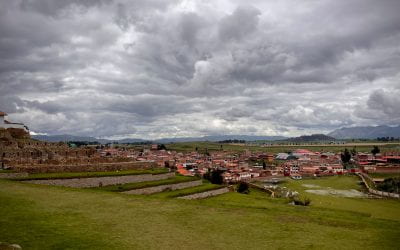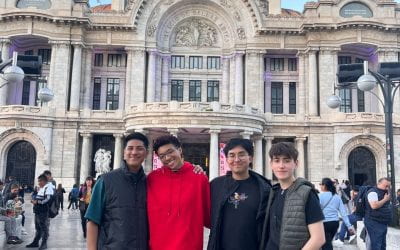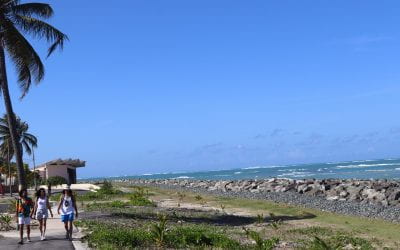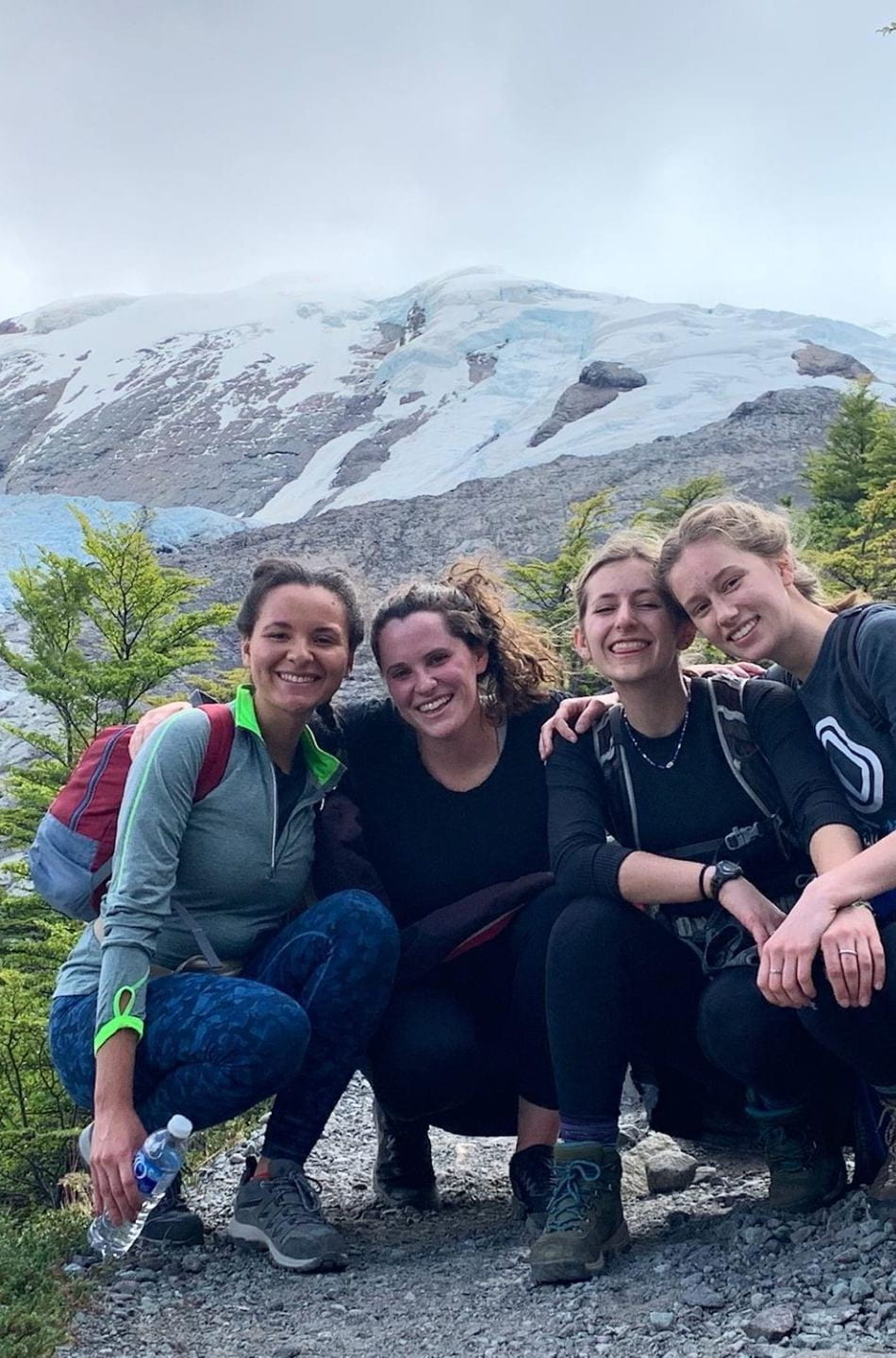
About the Author
Kayla Getter is a third-year A.B. Candidate in Social Studies at Harvard College, writing her thesis on how the 1994 Rwandan Genocide is taught in Rwandan secondary schools in a post-conflict and authoritarian regime. She has a passion for traveling, cycling and trying new foods!
Acerca del Autor
Kayla Getter es una estudiante de tercer año estudiando Estudios Sociales en Harvard College, escribiendo su tesis sobre el metodo de enseñanza en las escuelas secundarias del Genocidio de Ruanda en 1994 y el clima despues del conflicto en un régimen autoritario. ¡Le apasiona viajar, andar en bicicleta y probar nuevas comidas.
Until Next Time
Reflecting on My Time Abroad in Buenos Aires
On Tuesday, February 25, 2020, I waited outside a seven-floor apartment building in Buenos Aires with two large suitcases, a sense of uncertainty and a nervous pit in my stomach. Staring at a nameless keypad unsure what to do, an older man stepped out from the shadows of the awning next door. Overthinking every word in my tenuous Spanish, I managed to stutter “I am… umm… looking for…” “Estela!” he exclaimed, finishing my sentence. Within seconds, I was ushered up to the seventh-floor apartment one. My new Argentine home.
I was excited to start my study abroad in Buenos Aires with the Consortium for Advanced Studies Abroad (CASA). I chose CASA-Buenos Aires for the very special makeup of the program, which facilitates direct-enrollment in local universities, program-led seminars featuring renowned Argentine scholars and support of a native program director. In addition to CASA-Buenos Aires Proseminar course, I ultimately decided to enroll in two courses at Torcuato Di Tella University, studying contemporary Argentine literature and cross-comparing global education and a Spanish language course through University of Buenos Aires, School of Philosophy and Humanities.
Within days of arriving, I soon found that Buenos Aires is a city filled with kindness. The culture is lively and generous. Neighbors invited me over for dinner after a short conversation in the elevator. Strangers stopped on the street to offer directions, always extremely patient with my Spanish. Amidst the hustle and bustle of this city of 15 million people, there are large green spaces to sit and picnic. The city is scattered with ice cream shops and home to truly the best parrilla—grilled meat— I have ever tasted (although I will never tell my southern Grandpa that!). I loved my time in Buenos Aires—my only wish is that it could have stayed longer.
Because of Covid-19, my program sent all students back to their respective homes only three weeks after the program had begun. I started orientation in late February, while friends from Italy and China had already been asked to return home. I was home before all my classes began.
I was so nervous to study abroad; I had so many questions: Will I get along with my host mom? Will I be able to understand Argentine Spanish? What classes should I enroll in? How will my body adjust to Argentine nightlife staying out until 5 a.m.? But the question that loomed over all of us with the growing pandemic throughout the world was: Will we, too, be sent home from Buenos Aires?
Anxiety raced through my body as I tried to remain present. I explored the Recoleta Cemetery, lounged in parks with red wine and friends, met local university students at bars in Palermo Soho and planned spontaneous weekend adventures to Patagonia and Cariló—a beach town four-hours from Buenos Aires. At the same time, I was trying to find out what information my friends studying in London, South Africa and Australia were receiving about the growing pandemic. It was a game of telephone, as rumors spread around the whole world about when and who would be sent home, yet no one knew for sure. The director of the Office of International Education (OIE) at Harvard did not know, parents did not know, program leaders did not know and, for sure, other college students did not know.
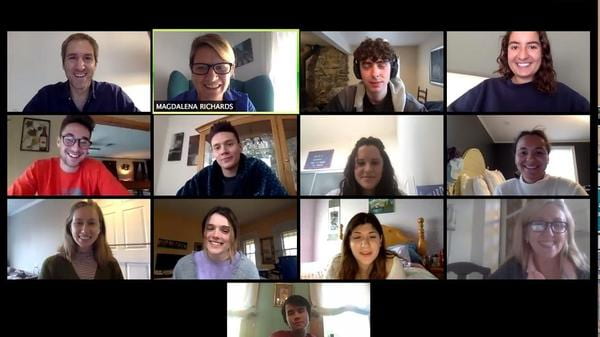
CASA-Buenos Aires Proseminar class over zoom with speaker Juan Torbidoni, a literature professor at Catholic University in Argentina.
In Buenos Aires, Covid-19 was always discussed in reference to cases in Italy or China. Over dinners with my host mom, she repeatedly said “there is no reason to worry” because it wasn’t on anyone’s radar. No one was worrying about the safety of Argentine citizens, until the night of March 15th, when President Alberto Fernández announced the closing of the border and all schools. The next morning, my program held an emergency meeting requiring all students to return home within five days. It felt as if the severity of the situation escalated from zero to a hundred in a matter of days.
So, unfortunately, I didn’t get to spend five months studying abroad in Buenos Aires, but the time I did have was extremely special. I embarked on the adventure of studying abroad confident in my goals: I wanted to speak Spanish, immerse myself in a new Latin American culture and travel throughout Argentina. And the truth is, although my study abroad experience was condensed into three weeks, I am proud to say I accomplished my three goals.
I am most grateful for the genuine and loving relationship I formed with my host mother, Estela. Sharing a home with Estela, we quickly fell into a routine. Because our schedules were different, we never saw much of each other during the day, but every evening we came together for dinner and talked about everything while eating. I learned about Argentina’s free public healthcare system, how much her children loved UBA (University of Buenos Aires), her beliefs on neighboring countries’ influx of immigration and how the economic crisis impacts her. We discussed our families, my friends and my worries about the future of the program, always with Estela patiently listening as I stumbled through my sentences. Our daily dinners not only fostered our relationship, but also created a comfortable space for me to practice Spanish. I had a one-on-one Spanish tutoring session every night, which significantly advanced my confidence and language skills. I definitely still hesitate when I speak and can’t quite roll my ‘r’s, but sitting down for a two-hour dinner conversation with my host mom every night exponentially improved my fluency. To this day, I still keep in touch with her via WhatsApp, and I know I always will have a Mamá Argentina.
From a distance, I am currently enrolled in two courses at the Torcuato Di Tella University, a language course through UBA and my program’s seminar. Even though all my courses are conducted via Zoom, I’m appreciative of the opportunity to continue (virtually) immersing myself in Argentina My favorite course is “Education, Politics and Society” with Professor Mariano Narodowski, a past DRCLAS Visiting Fellow at Harvard and former Minister of Education of the City of Buenos Aires (2007-2009). The small seminar facilitates discussion and reflection, as we open every class checking in with one another. In addition, in my Spanish language class, made up of international students from France, Brazil and Israel, we constantly read Argentine news articles addressing Covid-19 and analyze our various countries’ response to the pandemic. Although it is not the immersion I imagined, it is still a community outside of Harvard. This semester I am still learning from and with an international group of students who challenge me to understand the world through a different lens.
Lastly, I traveled a lot! Visiting the beautiful Iguazu Fall, a weekend beach trip to Cariló and the ultimate spur-of-the-moment four-day trip to Patagonia the weekend before we were told to return home. Argentina is a country full of diverse nature and climates, and if you are going to be asked to leave Argentina I highly recommend you receive that information overlooking the breath-taking mountains of Patagonia!
The whole world will forever be changed by Covid-19. I am so happy I was able to visit Argentina before quarantine because I had the privilege of taking part in spontaneous conversation, sharing food over late dinners and dancing until 5 a.m. I wanted to study abroad to learn from and with a new culture, and I continue to do just that virtually.
Covid-19 affects every single human being on this planet to various degrees. My story of leaving Argentina is a story of privilege. I was guided out of the country by Harvard which provided financial support for our emergency flights and Global Support Services (GSS), which constantly sent health updates of all the countries I traveled through to come home.
So many people in the world are stuck where they are: family members of those detained at the Mexico-United States border with their trials halted, prisoners who cannot be released regardless of the health situation, and people of color who are disproportionately affected by Covid-19 and not receiving adequate assistance or support.
I do not say this to negate my feelings, my real feelings of being sad to have left Argentina. But rather to name how I have been impacted by Covid-19, while purposefully giving voice to others’ experiences as well.
I know that I will return to Argentina one-day, with my bucket list handy. Until then, I am grateful to be home and safe.
Hasta la proxima vez
Reflexionando sobre mi tiempo en Buenos Aires
Por Kayla Getter
En febrero 25,2020 yo esperaba afuera de un apartamento de siete pisos con dos maletas grandes y llena de incertidumbre y nerviosismo. Mirando el teclado y sin saber que tenia que hacer, un hombre salió para ayudarme. Trate muy duro de decir una frase completa pero lo que salió fue tartamudear “Yo… estoy….buscando…”. Antes de terminar mi frase, el hombre dijo “Estela!” En muy poquito, yo me encontraba en el séptimo piso de este apartamento. Mi nueva casa.
Yo estaba entusiasmada de empezar mis estudios en Buenos Aires con el Consortium for Advanced Studies Abroad (CASA). Yo escogí CASA-Buenos Aires, un programa especial, porque facilita inscripción directa a universidades locales, seminarios con intelectuales argentinos y el apoyo de una directora de programa que vive en Argentina. Yo me inscribí a CASA-Buenos Aires Proseminar y dos cursos en Torcuato Di Tella universidad para estudiar literatura contemporánea, comparar educación global, y continuar mis estudios en español con un curso de la Universidad de Buenos Aires, Departamento de Filosofía y Humanidades.
Pocos días después de llegar, pronto descubrí que Buenos Aires es una ciudad llena de simpatia. La cultura es animada y generosa. Mis vecinos me invitaron a cenar después de una charla en un ascensor. Desconocidos se detuvieron en la calle para ofrecerme indicaciones, siempre extremadamente paciente con mi español. En medio del ajetreo de esa ciudad de 15 millones de personas, hay gran parques con espacio para sentarse y relajarse. La ciudad está dispersa con heladerías y la mejor parrilla que he probado (¡aunque nunca le diré eso a mi abuelo!). Me encantó mi tiempo en Buenos Aires—mi único deseo es que yo pudiera haber quedado más tiempo.
Debido a Covid-19, mi programa envió a todos los estudiantes a sus propias casas solo tres semanas después de empezar. Empecé orientación a finales de febrero, mientras mis amigas desde Italia y China ya se les había pedido que regresaran a casa. Tristemente, yo estaba en mi casa antes de que todos mis cursos había comenzaron.
Yo tenia muchos nervios de estudiar en el extranjero; yo tenía muchas preguntas. Como me iba ir con mi “host mom (don’t know how to say this)? Voy a entender el español argentino? Cuales clases debería escoger? Cómo reaccionaría mi cuerpo de salir en Argentina hasta las 5 de la mañana? Pero la pregunta que me preocupaba con la posibilidad de una pandemia muy cerca: Nos van a regresar a Estados Unidos?
La ansiedad recorrió mi cuerpo mientras trataba de permanecer presente. Yo exploré el Cementerio de la Recoleta, me relajé en parques con amigas tomando vino tinto, conocí a estudiantes universitarios locales por bares en Palermo Soho y planeé aventuras espontáneas de fin de semana en Patagonia y Cariló—un pueblo costero a cuatro horas de Buenos Aires. Al mismo tiempo, estaba tratando de averiguar qué información recibían mis amigos que estudiaban en Londres, Sudáfrica y Australia sobre la creciente pandemia. Era un juego de teléfono, a medida que los rumores se extendieron por todo el mundo sobre cuándo y quién sería enviado a casa, pero, nadie sabía a ciencia cierta. El director de la Oficina de Educación Internacional (OIE) en Harvard no lo sabía, los padres no lo sabían, los líderes del programa no lo sabían y, por supuesto, otros estudiantes universitarios no lo sabían.
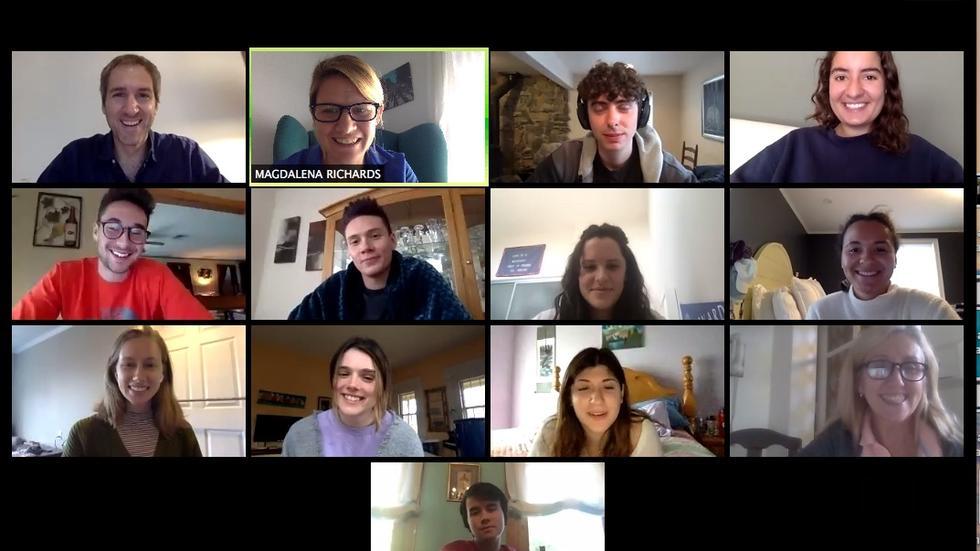
CASA-Buenos Aires Proseminario por zoom, con visitante Juan Torbidoni, un profesor de literatura en Universidad Católica Argentina.
En Buenos Aires, siempre discutió el Covid-19 en referencia a los casos de Italia y China. Mientras cené con mi anfitrión, ella repetidamente dijo “no hay razón para preocuparse” porque no estaba en el radar de nadie. A nadie estaba preocupada sobre la seguridad de los argentinos, hasta el noche de 15 de marzo, cuando el Presidente Alberto Fernández anunció el cierre de la frontera y todas las escuelas.A la mañana siguiente, mi programa/diplomado tuvo una reunión de emergencia que requería que todos los estudiantes regresaran a sus hogares dentro de los cinco días. Me sentía como si la gravedad de la situación aumentó de cero a cien en cuestión de días.
Entonces, desafortunadamente, no pude pasar cinco meses estudiando en Buenos Aires, pero el tiempo que tuve fue muy especial. Me embarqué en la aventura de estudiar fuera confiando en mis objetivos: hablar español, sumergirme en una nueva cultura latinoamericana y viajar por toda Argentina. Y la verdad es que, aunque mi experiencia se condensó en tres semanas, me enorgullece decir que logré mis tres objetivos.
Estoy muy agradecida por la relación genuina y amorosa que formé con mi madre anfitriona, Estela. Compartiendo una casa con Estela, rápidamente nos convertimos en una rutina. Debido a que nuestros horarios eran diferentes, nunca nos vimos mucho durante el día, pero todas las noches nos reunimos para cenar y hablar de todo mientras comíamos. Aprendí sobre el sistema gratuito de salud pública de Argentina, cuánto sus hijos amaban a la UBA (Universidad de Buenos Aires), sus creencias sobre la afluencia de inmigrantes de los países vecinos y cómo la crisis económica la impacta. Hablamos de nuestras familias, mis amigos y mis preocupaciones sobre el futuro del programa, siempre con Estela escuchando pacientemente mientras tropezaba con mis oraciones. Nuestras cenas diarias no solo fomentaron nuestra relación, sino que también me crearon un espacio cómodo para practicar español. Tuve una sesión individual de tutoría en español todas las noches, lo que aumentó significativamente mi confianza y mis habilidades lingüísticas. Definitivamente sigo dudando cuando hablo y no puedo pronunciar doble “r”, pero conversando por dos horas con mi madre anfitriona todas las noches mejoró exponencialmente mi fluidez. Hasta el día de hoy, sigo en contacto con ella a través de WhatsApp, y sé que siempre tendré una Mamá Argentina.
Desde la distancia, estoy inscrito en dos cursos en la Universidad Torcuato Di Tella, un curso de idiomas a través de la UBA y el seminario de mi programa. A pesar de que todos mis cursos se llevan a cabo a través de Zoom, aprecio la oportunidad de continuar (virtualmente) sumergiéndome en Argentina. Mi curso favorito es “Educación, Política y Sociedad” con el profesor Mariano Narodowski, ex miembro visitante de DRCLAS en Harvard y ex Ministro de Educación de la Ciudad de Buenos Aires (2007-2009). El pequeño seminario facilita la discusión y la reflexión, abriendo cada clase chequeando cómo estamos. Además, en mi clase de español, compuesta por estudiantes internacionales de Francia, Brasil e Israel, leemos artículos de noticias argentinas que abordan Covid-19 y analizamos la respuesta de nuestros países a la pandemia. Aunque no es la inmersión que imaginé, sigue siendo una comunidad fuera de Harvard. Este semestre todavía estoy aprendiendo de y con un grupo internacional de estudiantes que me desafían a entender el mundo a través de una lente diferente.
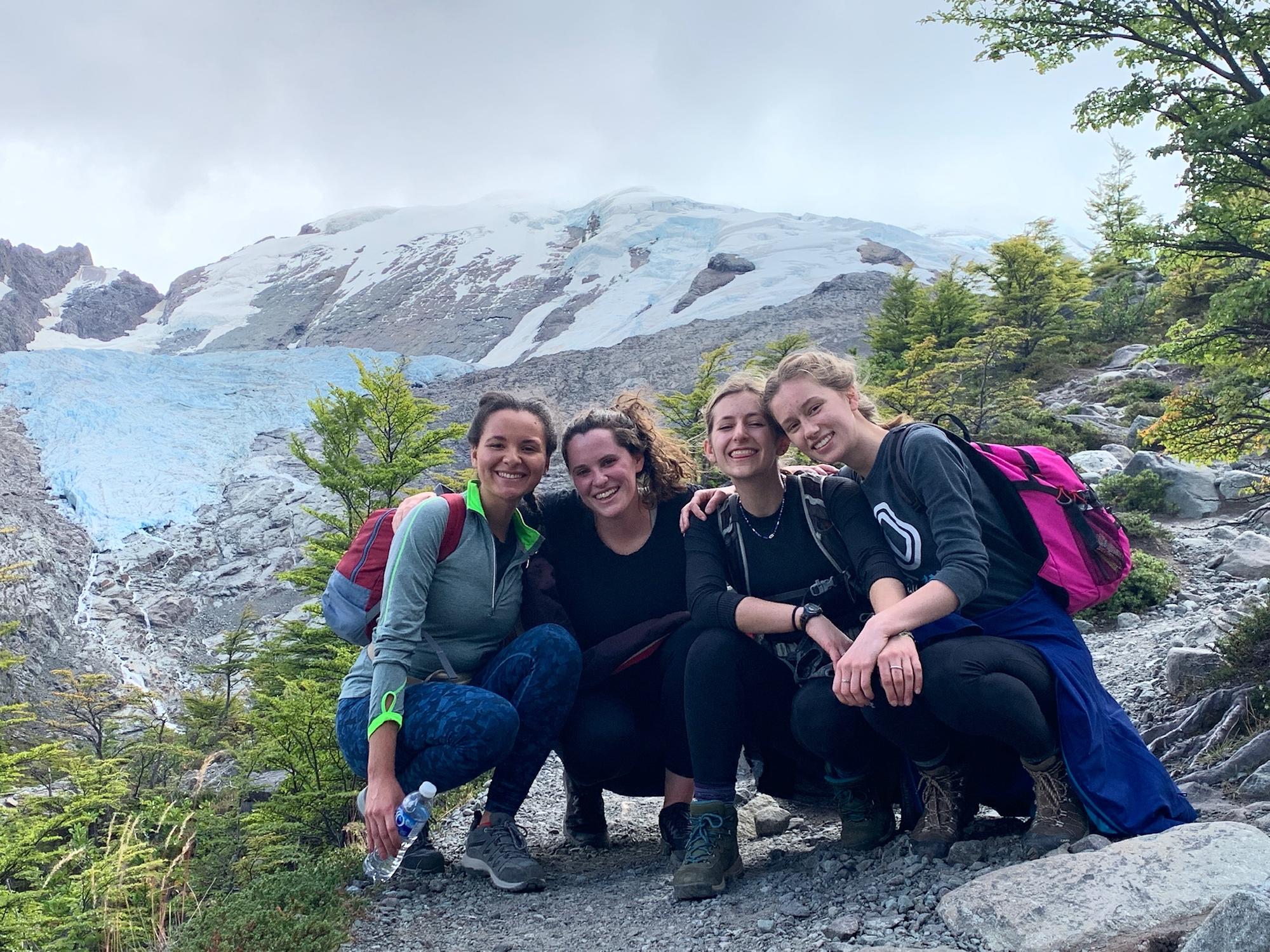
Paseando en Patagonia con otras estudiantes de CASA-Buenos Aires.
¡Por último, viajé mucho! Visité la hermosa cataratas de Iguazú, viajé un fin de semana a la playa de Cariló y vi Patagonia el fin de semana antes de que nos dijeran que regresáramos a casa. Argentina es un país lleno de naturaleza y climas diversos. ¡Y, si le van a pedir que salir Argentina, le recomiendo que reciba esa información con vistas a las impresionantes montañas de la Patagonia!
Covid-19 cambiará para siempre el mundo entero. Estoy tan feliz de haber podido visitar Argentina antes de la cuarentena porque tuve el privilegio de participar en unas conversaciones espontáneas, compartir comida durante cenas tardías y bailar hasta las 5 por la mañana. Quería en Argentina para aprender de y con una nueva cultura, y yo continuar haciendo eso virtualmente.
Covid-19 impacta cada humano en esta planeta a varios grados. Mi cuento de saliendo Argentina es un cuento de privilegio. Harvard me guió fuera del país por el apoyo financiero para los vuelos de emergencia y los Servicios de Apoyo Global (Global Support Services), que constantemente enviaban actualizaciones de salud de todos los países por los que viajaba para regresar a casa.
Muchas personas en el mundo están atrapadas donde están: miembros de unas familias de los detenidos en la frontera México-Estados Unidos a debido a sus juicios detenidos, prisioneros que no pueden ser liberados sin importar la situación de salud y personas de color que se ven desproporcionadamente afectadas por Covid-19 y que no recibe asistencia o apoyo adecuado.
No lo digo esto para refutar mis sentimientos, mis sentimientos de tristeza de salir de Argentina son verdaderos. Pero, más bien para nombrar cómo me ha impactado Covid-19, mientras que también compartir las experiencias de los demás.
Yo sé que algún día, voy a volver a Argentina con una lista de cosas para hacer. Hasta entonces, estoy agradecida de estar en casa y segura.
More Student Views
Andean Cultural Landscapes in Danger: The Chinchero International Airport
English + Español
Cusco stands as one of the most culturally and ecologically captivating regions globally.
Blossoming Bonds: Beauty and Belonging in Mexico
When I heard the news about my upcoming trip to Mexico, a surge of excitement coursed through me, and I immediately felt the urge to share this exhilarating news with my close friends and family.
Weapons of Mass Construction: Building a Puerto Rico for the People
I zip up my raincoat and turn on my headlamp as we tread along a damp trail in El Yunque National Rainforest, Puerto Rico.


